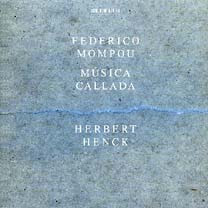Federico Mompou: Música Callada
La noche sosegadaMúsica Callada ("Silent music") is a collection of 28 short piano pieces by the Catalan composer Federico (Frederic) Mompou. Although the pieces make use of a modern and occasionally dissonant harmonic language, they create an atmosphere of stillness and inwardness. And although they were published over a 15-year-period from 1959 to 1974, they are remarkably unified in style and feeling.
en par de los levantes de la aurora,
la música callada,
la soledad sonora,
la cena que recrea y enamora. (San Juan de la Cruz, "Cántico Espiritual")
The tranquil night
at the time of the rising dawn,
the silent music,
the resonant solitude,
the repast that refreshes, and deepens love. (St. John of the Cross, "Spiritual Song")
Most of the pieces are headed by a marking which indicates its intended emotional affect and performance approach; these include lento (slow, applied to nearly half of the works), afflito e penoso (melancholy and painful), cantabile (singing), placide, tranquilo, and calme (sometimes très calme). Here is Federico Mompou performing the first piece from Book 1, which is marked angelico (angelic):
As the pianist Herbert Henck points out in the notes to his recording of Música Callada (ECM 1523), the pieces "seemed to continue beyond their conclusion as the composer—at least in the first two books of the cycle—consistently omitted the traditional double bar at the end. Ties on the final notes led symbolically into emptiness, meaning that the pedalled sounds should be...fading and losing themselves in the instrument and the surrounding space."
Mompou's sound-world evokes Erik Satie (especially his Gymnopédies and Gnossienes) and Debussy, whose music he encountered when he lived in Paris both before and after World War I. But at the same time Mompou's music conveys a deeply personal sensibility, especially when these quiet, contemplative and reflective pieces are heard as a series.
I'm aware of three complete recordings of Música Callada. Mompou himself recorded it in 1974, at the time that Book 4 was published (Ensayo 9716). While I haven't heard this disc, judging by the performance above Mompou plays these pieces expressively, often slowing or playing slightly behind the established tempo. Herbert Henck's traversal of the series is mentioned above; his approach is somewhat more rhythmically regular (and somewhat quicker) than the composer's, but for me that cooler, more "objective" approach also works well. There is also a new recording by Jenny Lin (Steinway & Sons 30004) that has received high praise; again I haven't heard it, but it seems to offer an interpretation closer to the composer's own, with modern sound quality.
Coda: Mompou himself was apparently a shy, reticent and gentle man. So it was a shock to discover that he was (initially, at least) a supporter of Franco. Since it seems unlikely that Mompou identified closely with either Franco's politics or his martial values, I can only assume that the devout Mompou saw Franco as a defender of the Catholic Church. I can attest, though, that you do not have to be a devout person to be powerfully affected by this profound, introspective music. As Mompou wrote of Música Callada, "This music is silent because it is heard in one’s inner self...It is my desire that this music should bring us closer to the warmth of life, and the expression of the human heart, that is always the same and yet constantly changing."
For the complete text in Spanish and English of "Cántico Espiritual," see joshuabocanegra.













Might I suggest you try the recording by Javier Perianes? Not easy to find, but it's meant to have been reissued this summer (Harmonia Mundi). To my ear, the best of the four.
ReplyDeleteAnonymous, I was unaware of Javier Perianes' recording; many thanks for suggesting it. I'll definitely seek it out.
ReplyDeleteIf I may be so bold, I have also recorded the complete Musica Callada on MSR Classics, MS 1282. Haskell Small. (Or see my website Haskell Small dot com)
ReplyDeleteThank you, Mr. Small, for alerting me to your recording. The page on Haskell Small's website devoted to Musica Callada can be seen by clicking on the title link; it includes audio samples of his performances of five of the pieces.
ReplyDelete